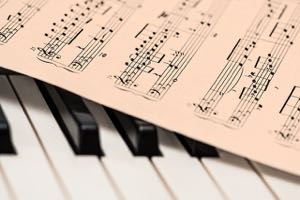by Emily Johnson
Did you know that every day, music affects how you think, feel, and act?
In movies, background music enhances the story and moves the action from scene to scene, but it’s main task? To evoke certain emotions in you, the viewer.
The same thing happens in television commercials. Media companies use music to manipulate your emotional responses. The more you’re drawn in, the more likely you are to buy the advertised product.
The same goes with the background music in stores and restaurants. Managers choose certain styles to prolong your stay, make you buy more products, and increase the odds that you’ll come back again.
All these entities and more use music for one reason: it works. Research has found that music not only evokes emotions when we listen to it, it also influences how we feel when we look at images. In one study, for example, happy music made happy faces seem even happier to participants, while sad music made a melancholy frown even sadder looking.
Since music affects your brain, emotions, and moods, why not to use it to create a better writing experience?
How Music Can Influence Your Writing
I’ve been a writer for a few years now, and I can’t imagine writing in total silence.
There’s something ominous about working on an article with no background music to help you relax, focus, and engage. When it’s quiet, I tend to pay attention to all the funny sounds that my apartment makes, which disturbs my writing process.
That means music is essential for me if I want to get things done. But even if you don’t have apartment noises to worry about, music can still have a positive effect on your writing process.
 1. Music helps you concentrate.
1. Music helps you concentrate.
Have you ever experienced this? You’re writing the next chapter of your novel and suddenly, you hear your kids arguing, or someone upstairs is marching there and back, and outside, people are singing or shouting.
Or maybe you’re writing in an office and one of your co-workers starts sniffing, sipping coffee or clipping her nails.
Normally, you wouldn’t pay much attention to these sounds, but if you need peace and quiet to focus, those sounds can be infuriating.
In these situations, it’s music to the rescue. Turn on some tunes you like to create a pleasant, non-invasive noise that helps you concentrate. It’s like giving a child a toy so he doesn’t disturb you while you’re working.
2. Music boosts creativity.
If you lack inspiration for writing, music can help you be more creative.
Research shows that listening to positive music stimulates your brain and helps you come up with unique ideas. It can also encourage “outside-the-box” thinking and help you find solutions to problems.
When you listen to “happy” music, it triggers the release of dopamine—the neurotransmitter that helps control the reward and pleasure centers in your brain. You’re likely to feel happy about the job you’re doing, which makes it more likely you’ll write an original piece.
 3. Music increases your productivity.
3. Music increases your productivity.
If you work as a writer for a company and have to write texts that aren’t very interesting, music can help make things more pleasant. And, if you start enjoying what you’re doing, you’ll be more productive, too.
But even if you tend to enjoy your every day writing experience, you may have times you feel tired or just out of it. Studies confirm that in such situations, music is helpful, particularly if you vary it up. You’ll be less likely to get bored when you listen to different sounds each day.
4. Music creates a special atmosphere.
If you’re writing a novel about a certain historical period, classical music can work as a symbol of that era and thus, move you in time to those days. Turn some on and you may find that your descriptions of that world seem more authentic.
If you’re writing a war scene, on the other hand, epic music will simulate the experience of taking part in a battle and thus, help you describe it. By manipulating your emotions, the music can make you feel stronger, more powerful and victorious so that you can better present what’s happening on the battlefield.
The same goes with writing articles. If you’re writing a case study or working with a number of sources, nature music, for example, can create an atmosphere of peace and quiet and, as research indicates, enhance your focus and attention.
 5. Music will make you feel less isolated.
5. Music will make you feel less isolated.
If you, like me, work alone as a freelance writer, you can get depressed. Most writers forget that human contact is essential for our well-being.
That isolation can affect your creativity and focus, but y you can turn it around with music. A recent study confirms that music has therapeutic effects, and that it’s so effective it can help treat illnesses like clinical depression and stroke.
Music has the power to keep sadness and depression at bay. When you listen to other people singing or playing instruments, you will feel less lonely, which can help you to keep up your positive mood.
As you can see, there are many benefits of listening to music while writing. The most important of them all is that it makes the experience more pleasant. And since it’s more pleasant, you’re more likely to:
- Write more often,
- write longer, and
- come up with more creative stories.
So the next question is, what kind of music should you listen to, and does it matter?
What Kind of Music Should You Listen to While Writing?
We know that listening to music can enhance your writing, but not all types of music are helpful. Some will increase your focus, but others will distract you.
 #1 Classical music
#1 Classical music
According to research, listening to classical music creates a number of advantages:
- positively affects your heart rate and heart variability
- decreases anxiety
- reduces stress
- improves quality of life
Let Beethoven, Debussy and Liszt inspire and relax you, and help you concentrate on your next chapter. Invite them home and let them keep you company during the long hours spent in front of your laptop. With them, you’ll have stronger memory, greater brainpower and a better mood.
If you don’t like listening to Mozart or Bach, or if you‘re bored with them, remember, there are many more composers, including modern ones. Click here to check out my favorite contemporary classical music.
#2 Nature music
Most of us think that the sound of rain, crashing waves, or singing birds is helpful only for falling asleep. Nature sounds, however, can help you concentrate at work and make you more satisfied about the text you’re writing. They can also make you feel happier and thus, fuel your productivity.
There are many nature pieces I enjoy listening to while writing, but this one is my favorite.
#3 Instrumental music
Whereas classical music can calm you down while writing, or transport you to another time, instrumental music of other types can lift your spirits and give you energy. If you enjoy faster pieces, rhythmic variations, and a combination of styles, this may be the type of music that works best for you.
If you don’t know what instrumental music to listen to, check out this album. It’s one of my favorites. The songs are played by a great American violinist, one who kept me company during many dark days and helped me be more productive when I didn’t feel like writing.
 #4 Movie soundtracks
#4 Movie soundtracks
People who listen to movie soundtracks often say that it’s “mood music.” Some may boost your mood and help you focus, while others can help get you into the mood of a specific scene or genre. If you’re writing sci-fi, for example, a Star Wars or Blade Runner soundtrack may be just what you need to help you slip more completely into your world.
Movie soundtracks also tend to be long, so they’re perfect for writers who spend numerous hours in front of their PCs. You can listen to great calming or elevating pieces without being distracted every three minutes to pick “the next song.”
When talking about movie soundtracks, some of the best pieces ever created were composed by Hans Zimmer. Listen to him for better productivity and concentration, or for when you need something to help you get into the heads of one of your characters. Check out this compilation here to start, and keep exploring.
#5 Video game soundtracks
Video game soundtracks are great to listen to when you lack motivation. Since video games require a lot of focus, their music selection tends to be very strategic. You can use that to your advantage!
Gamers often experience increased performance while listening to video game music, and so can you while writing your next chapter. Try it and see if it works!
You can listen to my favorite video game soundtrack here.
Some Music Is More Distracting Than Helpful
If you take a closer look at all the types of music above, you’ll notice that none of them feature songs with lyrics. There is a reason for that.
Lyrics are very distracting for writers.
Imagine you’re sitting and writing the next chapter. You lean back in your chair trying to come up with the word you have on the tip of your tongue, and the next moment a song with lyrics starts in the background. You become so distracted by the new words coming out of your speakers that you forget what you wanted to write. Frustrating.
To prevent this from happening, listen to songs without lyrics, with the exception of opera, since it’s usually sung in a language you don’t know.
Now, one more issue left.
What Sound System Equipment Should Writers Use?
There are three major tools you can use for listening to music while writing. Not all are the best for your health, however.
 1. Earphones.
1. Earphones.
Earphones are small, handy, and allow you to listen to music without disturbing others. They are relatively cheap and have a good quality sound. When using earphones, you can listen to music from a variety of equipment: your PC, laptop, tablet, phone or MP3 Player.
Research shows, though, that earphones are NOT the healthiest for your hearing. When using them, remember:
- Earphones can cause hearing loss, so don’t listen to music louder than 90 decibels. Experts also recommend that you avoid using earphones for longer than 15 min at a time. If you want to exceed that time, turn the volume down and give your hearing a rest every now and then.
- Earphones can cause ear infections, so don’t share them with anyone and wash them often with antibacterial wipes.
- Earphones might cause brain problems because they produce electromagnetic waves, so don’t use them every day.
- Earphones can cause pain and numbness in the ears, so if you notice any of these side effects, stop using them.
2. Headphones.
Headphones are bigger and can be more expensive than earphones, but many buy them because they tend to be more comfortable. The problem, however, is the same as with earphones. Headphones can also result in hearing loss and cause pain in ears.
Also, since headphones are bigger, they can push against your outer ear and cause pain. Thus, choose those that match the shape of your ear and don’t use them too long, too often, or with too loud a sound.
 3. Loudspeakers.
3. Loudspeakers.
Of all three types of sound system equipment, loudspeakers are the best choice. They don’t touch your ears, so they can’t cause pain or infections, and the possibility of hearing loss is smaller.
That doesn’t mean you can listen to deafening music, though. Remember not to play it too loud. Make the environment safe and pleasant for yourself as well as your neighbors and family members.
Are You Ready to Try Listening While Writing?
Listening to music has a number of benefits for writers. If you tend to get distracted, get the blues when you’re alone writing, or need something to inspire or motivate your next scene, try listening to classical music, instrumental music, or movie soundtracks.
Because it’s very important to stay healthy while writing, remember not to listen to any type of music too loudly on your earphones, headphones or loudspeakers. Turn the volume down so as to avoid hearing damage or hearing loss and enjoy your writing experience with the sound of crashing waves, an electric violin, or even epic battle music.
May the music calm you down, inspire you, and help you write your next bestseller!
* * *
 Emily Johnson is a blogger and a content strategist.
Emily Johnson is a blogger and a content strategist.
She is also a contributor to many websites about career advice, productivity, work issues, blogging and writing.
You can find about her and her work on Twitter.
Sources:
Burnett, Dean. “Does Music Really Help You Concentrate?” The Guardian, 20 Aug. 2016.
https://www.theguardian.com/education/2016/aug/20/does-music-really-help-you-concentrate. Accessed 10 Oct. 2017.
Bruner II, Gordon C. “Music, Mood, and Marketing.” Journal of Marketing 54.4 (1990): 94-104. JSTOR. Web. 10 Oct. 2017.
Fox J.G. and E.D. Embrey. “Music – an aid to productivity.” Applied Ergonomics 3.4 (1972): 202-205. Web. 23 Oct. 2017. http://www.sciencedirect.com/science/article/pii/0003687072901019
MacDonald, Raymond A.R., Gunter Kreutz and Laura Mitchell, editors. Music, Health, and Wellbeing. Oxford UP, 2012.
Rudinow, Joel. “Music as a Healing Art (Music and Medicine, Body and Soul).” Soul Music: Tracking the Spiritual Roots of Pop from Plato to Motown. Michigan: U of Michigan Press, 2010. 173-196.
Schellenberg, Glenn E. and Michel W. Weiss. “Music and Cognitive Abilities.” The Psychology of Music. 3rd ed. Edited by Diana Deutsch, Academic Press, 2013.
Trappe, Hans-Joachim. “The effects of music on cardiovascular system and cardiovascular health.” Review by Heart, BMJ Journal 96.23 (2010). Accessed 23 Oct. 2017. http://heart.bmj.com/content/96/23/1868.short
Vesper, Inga. “Need a creativity boost? Try listening to happy background music.” New Scientist, 6 Sept. 2017. https://www.newscientist.com/article/2146534-need-a-creativity-boost-try-listening-to-happy-background-music/. Accessed 10 Oct. 2017.
Marck Changizi, “Why Does Music Make Us Feel?” Scientific American, September 15, 2009, https://www.scientificamerican.com/article/why-does-music-make-us-fe/.
“Your earphones could make you sick!” The Health Site, January 23, 2015, http://www.thehealthsite.com/diseases-conditions/your-earphones-are-causing-you-health-problems/.

